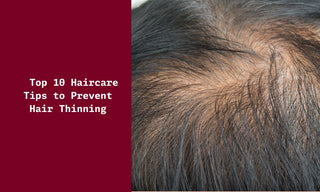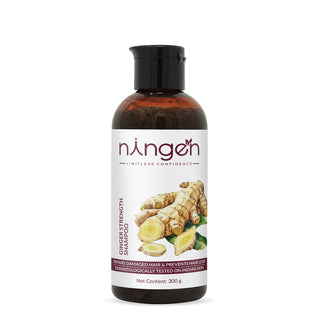Every strand of hair tells a story, but when thinning occurs, those stories can become fraught with concern. Hair thinning affects countless individuals, leading to feelings of insecurity and self-doubt. Understanding the reasons behind this common issue is the first step in taking control and nurturing your hair. Hair thinning is a common concern that many of us face, often without even realizing it. With our busy, fast-paced lives, it’s easy to neglect our hair—whether it’s from stress, lack of time for proper care, or the harsh effects of pollution and styling. But thinning hair can affect how we feel about ourselves and our confidence. The good news is, there are simple and effective ways to help prevent hair thinning, giving your hair the care it deserves. In this blog, we’ll share the top 10 haircare tips to prevent hair thinning that can make a real difference in keeping your locks healthy and full. Let’s get started!
In This Article;
- What Are The Reasons For Hair Thinning?
- 10 Tips to Prevent Hair Thinning
- Do Natural Ingredients Work Better To Prevent Thinning Of Hair?
- Natural Ingredients to Help Prevent Hair Thinning
- The Bottom Line
- TL;DR
- Frequently Asked Questions
What Are The Reasons For Hair Thinning?
Hair thinning is a common hair concern that can be influenced by a variety of factors. Understanding these reasons is crucial for addressing and preventing further hair loss.
- Genetic Factors: Androgenetic alopecia is a hereditary condition that is a leading cause of hair thinning, affecting both men and women as they age.
- Nutritional Deficiencies: A diet lacking essential nutrients, such as omega-3 fatty acids, iron, and proteins, can lead to reduced hair density and vitality.
- Hormonal Imbalances: Changes in hormone levels, particularly during pregnancy, menopause, or due to thyroid issues, can significantly impact hair health.
- Medical Conditions and Treatments: Several medical conditions and treatments, including severe illnesses, chemotherapy, and certain medications, may contribute to hair breakage and loss.
- Scalp Health: Issues like scalp irritation, dandruff, or infections can affect hair follicles and impede hair growth.
- Stress and Lifestyle: Chronic stress and poor lifestyle choices, such as lack of sleep or smoking, can disrupt blood circulation, affecting the hair shaft and its growth.
- Environmental Factors: Exposure to pollutants and UV radiation can damage hair strands, leading to thinning over time.
By addressing these factors, individuals can work towards maintaining beautiful hair and preventing excessive hair thinning.
10 Tips to Prevent Hair Thinning
1. Maintain a Balanced Diet: Ensure your diet is rich in vitamins and minerals such as iron, zinc, vitamin D, and biotin. Foods like leafy greens, lean proteins, nuts, and fish are essential for maintaining healthy hair.
2. Stay Hydrated: Drink a lot of water throughout the whole day to keep your hair & scalp hydrated. Proper hydration can improve overall hair health and prevent dryness, which can contribute to thinning.
Here's how water plays an essential role in promoting healthy hair:
- Moisturization: Water hydrates the scalp, helping to prevent dryness and flakiness. It ensures that hair strands are moisturized from root to tip, reducing breakage and enhancing flexibility.
- Nutrient Transport: Adequate hydration facilitates the efficient transport of essential
- 3 nutrients and vitamins through the blood, reaching the hair follicles to promote healthy hair growth.
- Blood Circulation: Proper water intake enhances blood flow to the scalp, which is crucial for maintaining hair density and encouraging hair regrowth.
- Toxin Flush: Staying hydrated helps flush out toxins from the body, preventing scalp irritation and promoting a healthier environment for hair growth.
3. Gentle Hair Care: Use a mild shampoo and avoid harsh chemicals. Be gentle while washing & styling your hair. Avoid excessive rubbing and use a wide-tooth comb to prevent breakage.
4. Limit Heat Styling: Reduce the use of heat styling tools such as blow dryers, flat irons, and curling wands. High heat can damage hair and lead to thinning over time.
Strategies to Protect Your Hair Strands from Excessive Heat:
- Use a Heat Protectant: Before styling, always apply a heat protectant spray or serum to shield your hair follicles and prevent damage.
- Invest in Quality Tools: Choose styling tools with adjustable temperature settings to cater to your specific hair type, reducing the likelihood of overheating.
- Air Dry Whenever Possible: Give your hair a break from heat by air drying. Avoid using blow dryers as much as possible to preserve hair health.
- Lower the Temperature: While using styling tools, set them to the lowest effective temperature to minimize hair damage and maintain hair density.
- Limit Heat Styling Frequency: Reduce the number of times you style your hair weekly with heated tools to prevent hair breakage and encourage healthy hair growth.
5. Regular Scalp Massage: Massaging your scalp can improve blood circulation to the hair follicles, promoting growth and preventing thinning. Incorporate essential oils such as rosemary or peppermint for added benefits.
Key Benefits of Scalp Massages:
- Improved Blood Circulation: Stimulating the scalp increases blood flow to the hair follicles, ensuring they receive vital nutrients and oxygen necessary for hair regrowth.
- Reduction in Scalp Tension: Regular massages can alleviate tension in the scalp, which might be a contributing factor to hair loss.
- Promotion of Hair Thickness: With better circulation, hair strands can grow stronger and thicker, enhancing overall hair density.
Scalp Massage Techniques:
- Use fingertips to gently massage in circular motions.
- Apply slight pressure to stimulate the scalp without causing irritation.
- Incorporate essential oils like rosemary or lavender for added nourishment.
6. Avoid Tight Hairstyles: Hairstyles that pull tightly on the hair, such as ponytails or braids, can lead to traction alopecia. Opt for looser styles & give your hair a break from tight styles.
7. Reduce Stress: Chronic stress can contribute to hair thinning. Practice stress management techniques such as yoga, meditation, or regular exercise to promote relaxation and overall health.
8. Consider Supplements: If necessary, consider taking supplements that support hair health, such as biotin, collagen, or omega-3 fatty acids. Consult a healthcare professional before you start any new supplements.
Here's a concise guide to some vital supplements that can nourish your hair strands from the inside out:
- Biotin (Vitamin B7): Known for enhancing hair density, biotin supports cell growth and improves hair thickness.
- Omega-3 Fatty Acids: Found in fish oil, these nutrients enhance blood circulation to the scalp, reducing hair breakage and promoting thicker hair.
- Vitamin D: Crucial for healthy hair follicles, this vitamin prevents severe hair loss, especially in individuals experiencing androgenetic alopecia.
- Iron: Critical for blood flow, iron deficiency can lead to hair damage and thinning, making supplementation essential for boosting hair regrowth.
- Zinc: This mineral combats scalp irritation and helps maintain the integrity of hair strands, contributing to overall hair health.
9. Regular Hair Trims: Get regular trims every 6-8 weeks to remove split ends and keep your hair healthy. This can prevent further breakage & make your hair appear fuller.
10. Consult a Professional: If you notice significant hair thinning, seek advice from a dermatologist or trichologist. They can identify underlying issues and recommend appropriate treatments or therapies to prevent further loss.
Here’s a quick look at essential nutrients and their sources for hair health:

Also read: How to get rid of flaky scalp?
Do Natural Ingredients Work Better To Prevent Thinning Of Hair?
Natural ingredients can be effective in preventing hair thinning due to several reasons:
- Nutrient-Rich: Many natural ingredients, such as aloe vera, coconut oil, and essential oils, are rich in vitamins and minerals that nourish the scalp and hair follicles, promoting healthier hair growth.
- Anti-Inflammatory Properties: Natural ingredients like turmeric and rosemary have anti-inflammatory properties that can help soothe the scalp and reduce follicle irritation, which may otherwise contribute to hair thinning.
- Improved Circulation: Ingredients like peppermint oil can stimulate blood circulation in the scalp, ensuring that hair follicles receive sufficient nutrients and oxygen necessary for healthy growth.
- Strengthening Hair: Natural ingredients such as biotin, found in various oils and herbs, can strengthen hair strands and reduce breakage, which is often mistaken for thinning.
- Gentle on Scalp: Natural remedies are typically free from harsh chemicals and synthetic additives, making them gentler on the scalp and reducing the risk of allergic reactions or irritation that can exacerbate hair thinning.
- Hormonal Balance: Certain natural ingredients, like saw palmetto, may help balance hormones that contribute to hair loss, particularly in conditions like androgenetic alopecia.
- Moisture Retention: Natural oils, such as argan oil or jojoba oil, help lock in moisture and prevent dryness, reducing hair brittleness and promoting a thicker appearance.
- Promotes Healthy Scalp Environment: Ingredients like tea tree oil can help combat scalp issues like dandruff and fungal infections, which can hinder healthy hair growth and contribute to thinning.
- Restores pH Balance: Natural ingredients often help restore the scalp's natural pH balance, supporting an optimal environment for hair growth.
- No Side Effects: Unlike many pharmaceutical treatments, natural ingredients tend to have fewer side effects, making them a safer option for long-term use in preventing hair thinning.
Also read: 5 hair conditioner ingredients that stop hair fall forever.
Natural Ingredients to Help Prevent Hair Thinning
- Biotin: Biotin (vitamin B7) plays a vital role in maintaining healthy hair and promoting growth. Biotin supplements or natural sources like eggs, nuts, and avocados can help prevent thinning hair.
- Vitamin D: This vitamin is crucial for the hair follicle cycle. Sun exposure enhances vitamin D levels, but it can also be found in fatty fish, egg yolks, and fortified foods.
- Iron: Low iron levels can also lead to hair loss. Consuming iron-rich foods such as red meat, spinach, lentils, and beans can support hair health.
- Zinc: This mineral is vital for hair tissue growth and repair. It also helps keep the oil glands around the hair follicles functioning correctly. Foods rich in zinc include nuts, seeds, dairy products, and whole grains.
- Omega-3 Fatty Acids: These healthy fats nourish hair follicles and promote hair thickness. Sources include fish like salmon, walnuts, and flaxseeds.
- Saw Palmetto: An herbal remedy believed to inhibit the conversion of testosterone to DHT (dihydrotestosterone), which is linked to hair thinning. Saw palmetto is also available as a supplement.
- Pumpkin Seed Oil: Known to potentially improve hair thickness due to its high content of zinc, magnesium, and omega-3 and omega-6 fatty acids.
- Nettle Leaf: Rich in vitamins A, C, and K, as well as minerals like iron and calcium, nettle can help stimulate hair growth and prevent thinning.
- Aloe Vera: This natural remedy can help soothe the scalp, reduce dandruff, and improve hair health, potentially reducing hair thinning.
- Green Tea: Contains polyphenols and antioxidants that may help prevent hair loss. Drinking green tea or using products with green tea extracts can be beneficial for hair health.
- Ginseng: Known for its potential to stimulate hair growth and strengthen hair follicles, ginseng can be taken in supplement form or used in topical treatments.
- Rosemary Oil: This essential oil has been studied for its ability to improve circulation to the scalp, supporting hair growth and thickness. It can be integrated with a carrier oil and massaged into the scalp.

The Bottom Line
Hair thinning is a common challenge that many face, but with the right knowledge and proactive care, it can be managed effectively. By incorporating these top 10 haircare tips into your daily routine, including maintaining a balanced diet, staying hydrated, and practicing gentle hair care, you can take significant steps toward promoting healthy hair growth and preventing further thinning. Natural ingredients and supplements can also provide valuable support in strengthening your hair from the inside out. Remember, consistency is key, and while it may take time to see noticeable improvements, your efforts will be worthwhile in restoring your hair's vitality and boosting your confidence. If you find that hair thinning persists, don’t hesitate to seek professional advice for personalized solutions. Keep nurturing your hair, and it will tell a more confident story in no time.
TL;DR
Hair thinning is a common issue caused by factors such as genetics, stress, nutritional deficiencies, and environmental damage. Preventing hair thinning involves adopting a balanced diet, staying hydrated, using gentle hair care practices, reducing heat styling, managing stress, and incorporating scalp massages. Natural remedies like essential oils, biotin, and omega-3s can nourish the hair and scalp. Consistent care and professional advice can help manage hair thinning effectively and restore confidence.
Frequently Asked Questions
Q1. What are the main causes of hair thinning?
Hair thinning can be caused by genetics, hormonal imbalances, stress, poor nutrition, medical conditions, environmental factors, and scalp issues.
Q2. How can I prevent hair thinning naturally?
Prevent hair thinning by eating a nutrient-rich diet, staying hydrated, using natural oils, managing stress, and practicing gentle hair care.
Q3. Which vitamins are essential for preventing hair thinning?
Vitamins such as biotin, vitamin D, zinc, and iron are crucial for maintaining healthy hair and preventing thinning.
Q4. How does stress affect hair thinning?
Chronic stress disrupts blood circulation to hair follicles, leading to hair thinning over time. Stress management techniques can help.
Q5. What are some effective natural remedies for thinning hair?
Natural remedies include aloe vera, rosemary oil, pumpkin seed oil, green tea, and ginseng, which nourish the scalp and promote hair growth.
Q6. Can scalp massages really prevent hair thinning?
Yes, regular scalp massages improve blood circulation, stimulate hair follicles, and reduce tension, promoting healthier, thicker hair.
Q7. How can I protect my hair from heat styling damage?
Use heat protectants, reduce heat styling frequency, lower styling tool temperatures, and opt for air-drying whenever possible.
Q8. Are supplements effective for preventing hair thinning?
Supplements like biotin, omega-3s, collagen, and zinc can support hair health, but consult a professional before starting any supplement.
Q9. What hairstyles can prevent hair thinning?
Avoid tight hairstyles like ponytails and braids that cause traction alopecia. Opt for looser styles to reduce strain on the hair.
Q10. When should I see a professional about hair thinning?
Seek professional advice if hair thinning persists despite lifestyle changes, as it may indicate an underlying condition requiring treatment.










